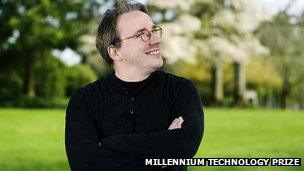Linux creator Linus Torvalds shares Millennium Technology Prize
- Published

Mr Torvalds has worked on the Linux kernel for more than two decades
Linus Torvalds, creator of Linux, has been named joint winner of the 2012 Millennium Technology Prize.
He shares the honour with Dr Shinya Yamanaka, a stem cell scientist.
Technology Academy Finland said Mr Torvalds's achievements had "had a great impact on shared software development, networking and the openness of the web".
It is the first time the bi-annual award has been split. Each man receives 600,000 euros ($752,000; £483,000).
Mr Torvalds developed the first version of a Linux operating system while studying at the University of Helsinki, Finland in 1991.
When he posted details of the project on Usenet he described the project as "just a hobby, [it] won't be big and professional".
The Linux kernel - the code that lets software and hardware work together - has since been through many revisions. It now powers a range of Linux-based systems behind many of the world's computer servers, digital video recorders, stock exchange equipment and Google's Android smartphone platform.
Linux community
Mr Torvalds remains in charge of deciding which changes should be made to the kernel, based on submissions from thousands of other software engineers who volunteer contributions to the open source project.
It is estimated that a total of 73,000 man-years have been spent working on the code.
"Linus Torvalds's work has kept the web open for the pursuit of knowledge and the benefit of humanity - not simply for financial interests," said Dr Ainomaija Haarla, president of Technology Academy Finland.
Mr Torvalds now works out of an office at his home in Oregon, having moved to the US in 1997. But he acknowledged his roots in accepting the award.
"This recognition is particularly important to me, given that it's given by the Technology Academy of Finland," he said.
"I'd also like to thank all the people I've worked with, who have helped make the project not only such a technical success, but have made it so fun and interesting."
Job offers
Mr Torvalds recently revealed that over the years, others - including Apple's founder, Steve Jobs - had tried to tempt him to switch jobs.
But he told the BBC that he had no intention of leaving the Linux Foundation - the non-profit organisation committed to promoting and supporting the kernel's development.
"Hey, I've had job offers, but I've really tried to make it very clear to everybody that what I appreciate most is my neutral status, and it really turns out that I think all the companies involved with Linux really do prefer things that way too," he said.
"I seriously believe that even though the Linux kernel has become a big thing for a number of large companies, people really do appreciate how nice it is that I don't work for any of them."
- Published13 June 2012
- Published13 June 2012
- Published20 April 2012